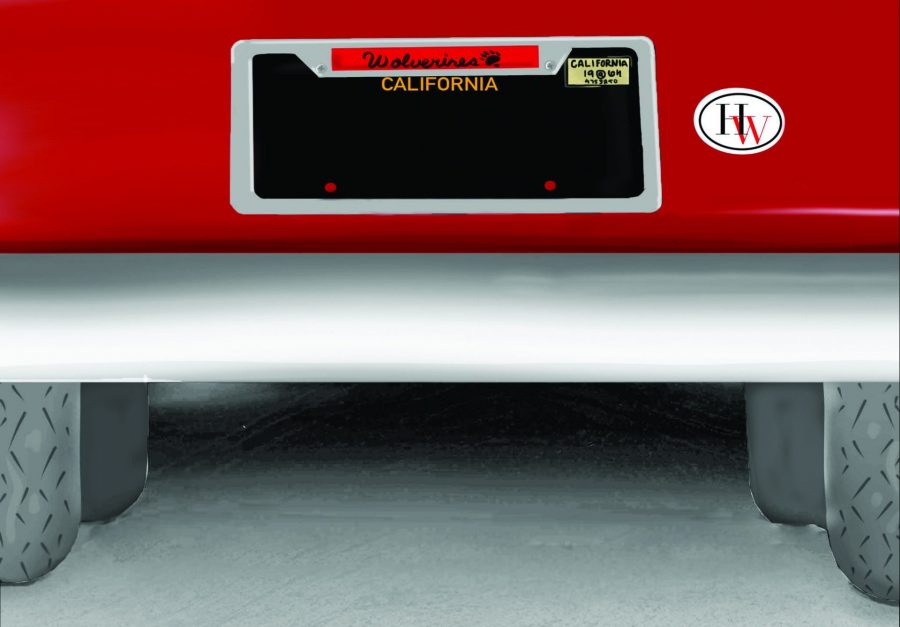Standing in her driveway at 7 a.m., Kylie Azizzadeh ’21 waited for her carpool to pick her up. She thought excitedly about her commute to school, complete with close friends, upbeat music and fulfilling conversations.
“There are no disadvantages,” Azizzadeh said, “I would definitely recommend carpooling.”
In an effort to combat its parking shortage, the school has intentionally made spaces harder to obtain.
With the implementation of new policies that prohibit parking in surrounding neighborhoods, carpooling is the most cost-effective way to get to school, Katie Kennedy ’21 said.
“Carpooling saves money, because you don’t have to pay as much for your spot, and it helps the other person who’s driving you to school,” Kennedy said.
Students explain the benefits of carpooling
Juliette O’Brien ’21 said she often rides with her teammates to and from water polo games. Rather than carpooling to reduce traffic or the cost of a space, O’Brien said she chooses to carpool because it benefits the environment.
“The people I carpool with can also drive, but we choose to carpool because its good for the environment and more fun,” O’Brien said. “Sometimes we switch around who drives because if someone has a test, we can act as a chauffeur so they can study.”
Mathematics teacher Derric Chien said he carpools around twice a week. He said that when he carpools, he is able to unwind before and after work.
“I really enjoy the days I carpool because I can just relax in the car,” Chien said.
In terms of students carpooling, Chien said he thinks that students taking the initiative to find carpools is beneficial to the community.
“I think it’s helpful for kids to carpool to school mainly so that they don’t have to individually drive every day,” Chien said. “Additionally, carpooling would allow for more parking spaces.”
Owen Hudgins ’21 said he loves carpooling because of the bonds he has formed. He said that driving with others also decreases commute time because he is able to utilize the carpool lane.
“I love [carpooling] because I’ve made a new really close friend,” Hudgins said. “It’s a great time in the morning when we listen to music and vibe.”
On the other hand, Skylar Graham ’20 said she believes that for those who live in neighborhoods with few other students who attend the school, arranging a carpool can be difficult.
Students explain the challenges of arranging a carpool
“I definitely think it would be a challenge [to carpool] because, on the bus I take, there are only two people who get on at my stop,” Graham said. “It’s the new Baldwin Hills bus. There are only about 13 people who get on in total, and most of them are sophomores who don’t drive yet.”
Graham said she believes that the stress she experiences from her early wake-up times could be relieved if more people in her area were able to drive legally.
“I wish there [was] someone on the bus who had a license, so I could carpool with them, because it would make it easier on me because I wouldn’t have to get up as early or have to be so frantic in the morning trying to catch the bus at an early time,” Graham said.
Although carpooling makes parking on campus more affordable, Graham said she does not think that the price of a spot is worth it.
“I think the high prices discourage me [from parking] in the lot.” Graham said, “Is [carpooling] really worth it to pay so much money a year to have a parking spot?”
At least one security guard patrols Halkirk, a neighboring street, in the mornings to ensure that students comply with the new restrictions. Graham said she feels the school’s new measures are unnecessary.
A Harvard-Westlake security guard explains his viewpoint on carpooling.
“[The school] should open up Halkirk for students to park, because it can be very difficult coming up Coldwater in the morning, trying to get into the parking lot,” Graham said. “I’ve heard a lot of students complaining about how it’s hard to get out of spaces, because they get blocked and cars get hit.”
Upper school security guard Sean Horton said he believes that the new parking rules have benefited both students and neighbors by improving the flow of traffic.
“If [many people ride] together, it eases traffic congestion on the highway,” Horton said. “It also eases traffic congestion on our campus, because we are already restricted to the limited amount of parking spaces we have available, so if you carpool, it frees up space. We have to be creative in making sure [people] have a safe way to park that’s not going to disrupt emergency responses or an ability to function as an institution, so that’s how carpools are able to help.”
Azizzadeh said she has found new friends through her sophomore and junior carpooling experiences.
“Carpooling is not only a great way to get around but a great way to build relationships,” Azizzadeh said. “Over the last year, I got extremely close with my carpool, and this year, I am as well. It’s a great way to start and end the day.”





























